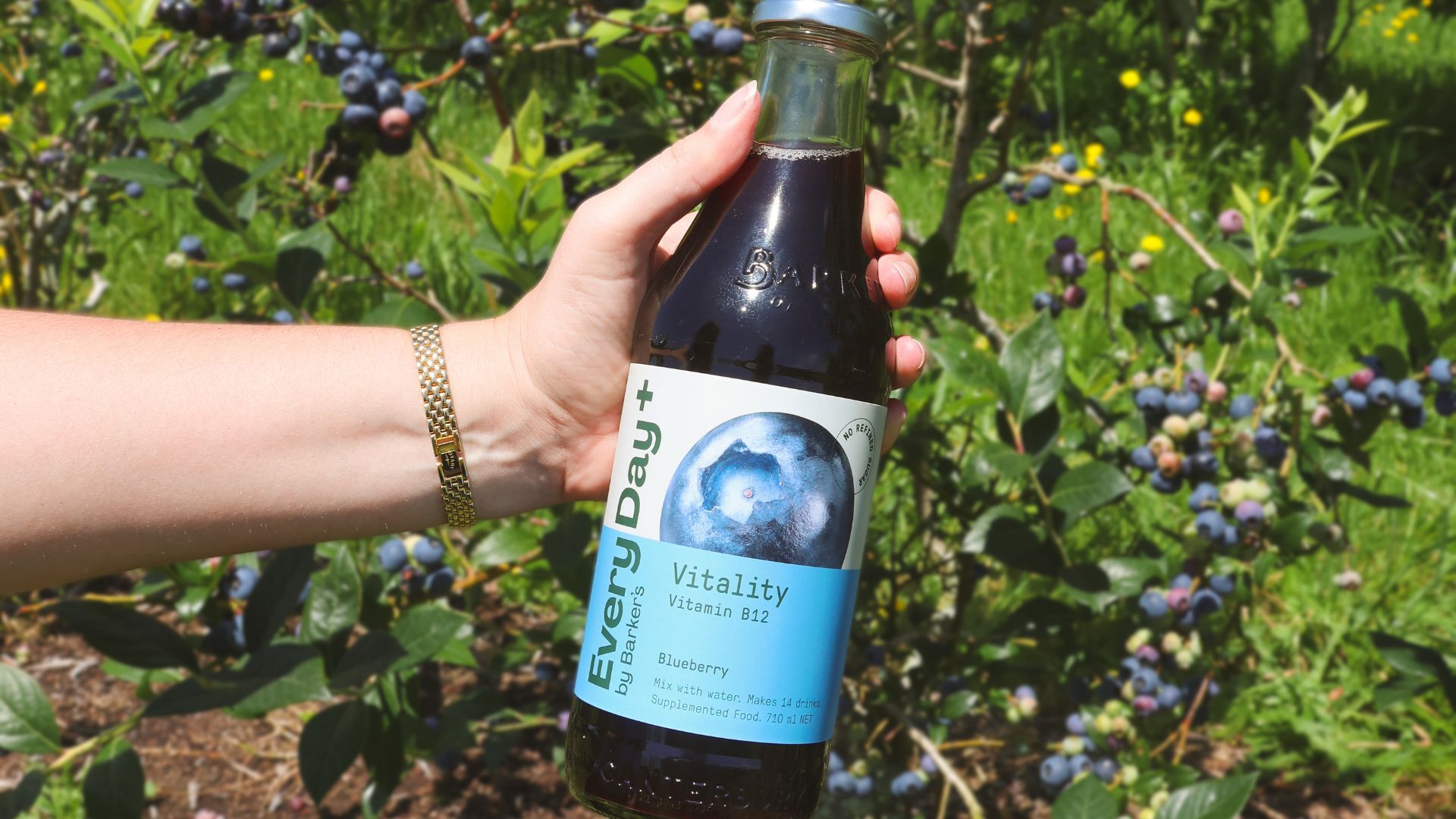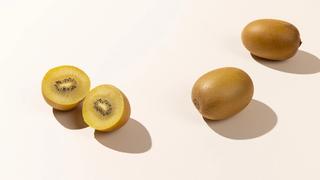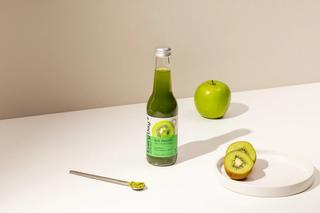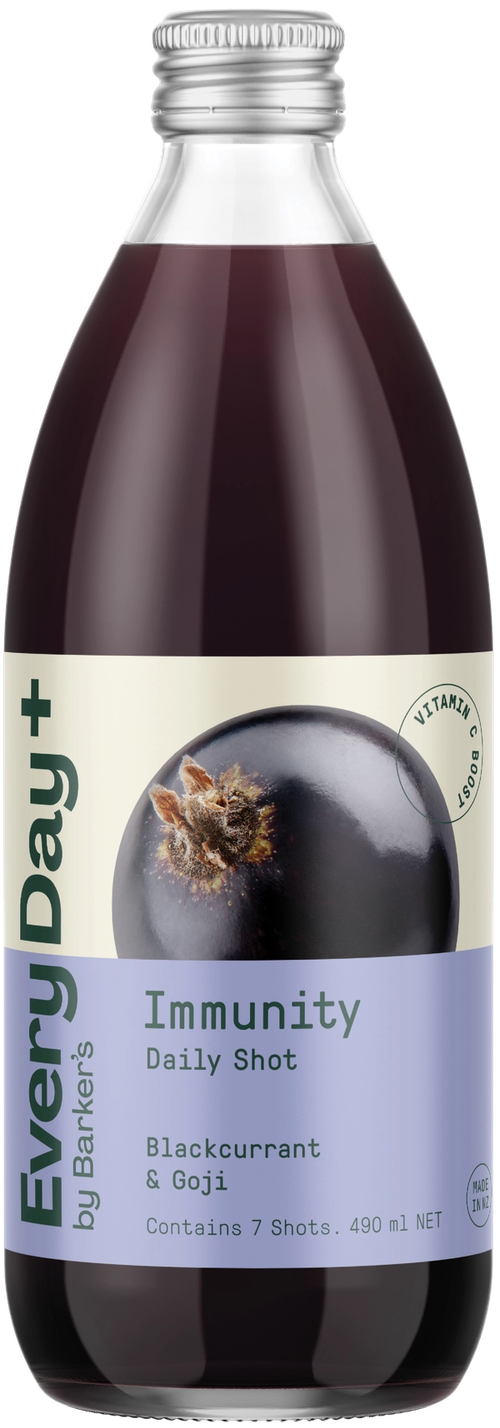Blackcurrants for Cardiovascular Health
2025-01-24
EveryDay+ Immunity range started with wholesome fruit and vegetables that are high in the antioxidant, Vitamin C, which we call out on the label. Antioxidants boost your immune system by protecting against free radicals.
Blackcurrants, found in our Immunity Blackadder Blackcurrant Syrup, Immunity Blackcurrant and Boysenberry Syrup, and the Blackcurrant & Goji Immunity Daily Shot, are also high in other antioxidants, Vitamin E and polyphenols.
What are free radicals?
Free radicals break down your cells over time. They are produced naturally in the body but can be accelerated by exposure to pesticides and air pollution, smoking, alcohol and fried foods.
The imbalance of free radicals and not enough antioxidants is known as oxidative stress. Your body succumbing to the common cold is an example of the short-term effects of oxidative stress that you’ve likely experienced.
However, if this imbalance persists long-term, oxidative stress damages the body’s cells, proteins and DNA. This damage is thought to contribute to the development of a range of conditions including the onset and progression of cardiovascular disease (CVD).
What is cardiovascular disease?
Cardiovascular Disease are a group of conditions affecting the heart and blood vessels, for example high blood pressure, heart disease, and stroke.
Almost 1 in 3 deaths in Aotearoa are caused by cardiovascular disease, according to the New Zealand Heart Foundation. It’s the leading cause of death worldwide. Some of us are predisposed to CVD, due to genetics, ethnicity or gender, but around behavioural factors such as exercise, smoking habits and diet are estimated to account for 80% of CVD risk.
An increased consumption of fruits and vegetables has been associated with a decreased risk of CVD. This is a continuing subject of interest for researchers.
Improving cardiovascular health through Vitamin E intake
As well as high Vitamin C content, Blackcurrants are extremely high in another antioxidant known as Vitamin E. Vitamin E widens blood vessels and helps to keep blood clots from forming.
A 2022 study by Parvin Mirmiran investigated the association between daily consumption of vitamins A, C, E, and zinc, and the prevalence of CVD. The study used data from participants of the Tehran lipid and glucose study which started in 1999 to determine the risk factors for non-communicable diseases. The main source of these antioxidants that the 5100 subjects consumed were fruit, vegetables and legumes.

Mirmiran’s study found that while Vitamins A and C and zinc didn’t have a noticeable impact on the occurrence of CVD, Vitamin E noticeably decreased the risk of CVD in participants.
Improving cardiovascular health through polyphenol intake
Polyphenols, a category of compounds found naturally in plant foods, are another antioxidant that reduces inflammation and oxidative stress.
There are over 1000 different polyphenols, organised into four main groups, and then further into sub-groups. For example, Blackcurrants are particularly high in polyphenols known as an anthocyanin, which come under the flavonoids category.
A 2008 study by Iris Erlund, wanted to see if Polyphenols found in berries give the same favourable results for cardiovascular health as other polyphenol-rich foods previously tested like cocoa, tea and dealcoholized red wine. At the time, this hadn’t been studied before.
Erlund investigated if a diet rich in berries was likely to improve function of platelets in the blood. Platelets prevent blood loss through clotting when the body is injured. In this case, the study wanted to see less clotting in participants.
The study looked at middle-aged, unmedicated subjects with CVD risk factors as they incorporated moderate amounts of berries into their diet over 8 weeks, against a control group.

Participants consumed two portions of berries daily, along with whole bilberries, crushed lingonberries, blackcurrant puree, strawberry puree, and chokeberry and raspberry juice. A combination of different berries was chosen to maximize the intake of various polyphenols while minimising the consumption of other bioactive compounds found in individual berry varieties. The study concluded that consumption of moderate amounts of berries resulted in favourable platelet function in the participants.
Conclusion
A healthy diet consisting of fruit and veg is not only important for your short-term immune function but as developing research suggests, could be one of the factors in reducing risk for cardiovascular diseases.
It’s important to eat a range of fruit and veg to get the different benefits. Vitamin C hasn’t been shown to noticeably improve cardiovascular health yet, but other antioxidants could be the answer to improving our defences against Aotearoa’s biggest killer.
Please note, EveryDay+ products are intended to complement a healthy lifestyle and are not a substitute for medical treatments or supplements. While we provide general tips and information on our blog, we recommend consulting a healthcare professional for personalised advice.
References
- Aprifel. (n.d.). Blackcurrant nutritional sheet. Aprifel. https://www.aprifel.com/en/nutritional-sheet/blackcurrent/?tab=composition_analyse_nutritionnelles#vitamines_raw
- ·Cleveland Clinic. (n.d.). Platelets. Cleveland Clinic. Retrieved January 9, 2025, from https://my.clevelandclinic.org/health/body/22879-platelets
- Erlund, I., Koli, R., Alfthan, G., Marniemi, J., Puukka, P., Mustonen, P., Mattila, P., & Jula, A. (2008). Favorable effects of berry consumption on platelet function, blood pressure, and HDL cholesterol. The American Journal of Clinical Nutrition, 87(2), 323–331. https://doi.org/10.1093/ajcn/87.2.323
- Heart Foundation. (n.d.). Heart disease statistics. Heart Foundation. https://www.heartfoundation.org.nz/statistics
- Mirmiran, P., Hosseini-Esfahani, F., Esfandiar, Z., Hosseinpour-Niazi, S., & Azizi, F. (2011). Associations between dietary antioxidant intakes and cardiovascular disease. Public Health Nutrition, 14(6), 1036–1044. https://doi.org/10.1017/S1368980011000307
- Tapiero, H., Tew, K. D., Nguyen Ba, G., & Mathé, G. (2002). Polyphenols: Do they play a role in the prevention of human pathologies? Biomedicine & Pharmacotherapy, 56(6), 304–311. https://doi.org/10.1016/S0753-3322(02)00203-3
- University of Rochester Medical Center. (n.d.). Vitamin E. URMC. https://www.urmc.rochester.edu/encyclopedia/content?contenttypeid=19&contentid=vitamine
- Villines, Z. (2017, July 29). Free radicals: How do they affect the body? Medical News Today. https://www.medicalnewstoday.com/articles/318652
- Wallace, T. C. (2019). Anthocyanins in cardiovascular disease. Nutrients, 11(3), 493. https://doi.org/10.3390/nu11030493
Featured Products
Related Posts

We love blueberries at EveryDay+ and use them in a few of our products for their...
Read more >
Warmer days, shorter nights - summer is the season for spritzes, sunshine and so...
Read more >
Dietary Fibre is a carbohydrate, mainly found in plant foods such as fruits, veg...
Read more >
Introducing our two new products specially formulated for gut health – a Raspber...
Read more >






